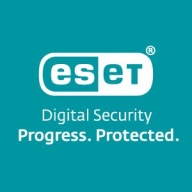

ESET Endpoint Protection Platform and SentinelOne Singularity Identity are both strong contenders in the cybersecurity domain, each offering distinct advantages. ESET seems to have the edge in resource efficiency and comprehensive feature inclusion, while SentinelOne leads in behavior-based threat detection and real-time updates.
Features: ESET stands out with its ThreatSense technology, Host-Based Intrusion Prevention System (HIPS), and a user-friendly management console. It's lightweight and provides real-time protection without over-consuming system resources. SentinelOne, however, emphasizes behavior-based threat detection, a cloud-native architecture, and strong focus on identity protection, ensuring real-time updates to counter emerging threats swiftly.
Room for Improvement: ESET can benefit from enhancing default heuristic detection, better managing licensing for virtual machines, and improving its cloud integration capabilities. SentinelOne could improve by offering more flexible endpoint management and integrating better with web filtering capabilities. Users have noted issues with agent management and support responsiveness as areas needing attention.
Ease of Deployment and Customer Service: ESET offers a wide range of deployment options including on-premises, public cloud, and hybrid environments, with variable customer support experiences. While some customers praise its support, others have encountered delays. SentinelOne, primarily operating in the public cloud, gets praise for cost-effectiveness but faces mixed feedback on customer support responsiveness and clarity.
Pricing and ROI: ESET is seen as cost-effective for small to mid-sized businesses, providing good value and quick ROI due to its low-resource design. SentinelOne is priced higher, reflecting its extensive feature set, yet concerns exist over price transparency. Its ROI is recognized through robust security features that help minimize recovery costs.
Normally, I cannot give a ten for support of all brands, as it is not always possible to get full support from companies.
They have been responsive to our needs as integrators and those of the client.
In terms of scalability, I can rate it eight or nine out of ten.
In terms of stability, I can rate it at nine out of ten.
A lightweight version of ESET might be beneficial as many of our clients have older CPUs and RAM.
There is a clear roadmap for improvements, including enhancing capabilities with AI and seamless functionality in an MSP model for deeper visibility across multiple agencies.
The pricing of ESET Endpoint Protection Platform is a bit high compared to other competitors.
The primary purpose is to protect computers from viruses and ransomware.
With visibility into endpoint telemetry, SentinelOne does provide useful information to find threat actors and empowers those who are in the business of threat hunting.


ESET Endpoint Protection Platform (EPP) is a cybersecurity solution designed to protect businesses of all sizes against a wide array of cyber threats. Its advanced technologies and user-friendly interface provide robust security for endpoint devices, such as desktops, laptops, and mobile devices, without compromising performance. ESET's approach combines multiple layers of protection, including traditional signature-based detection with advanced heuristic analysis, behavioral monitoring, and machine learning, to effectively counter both known and emerging threats.
ESET's Endpoint Protection Platform is based on a multi-layered defense strategy, which utilizes various technologies like cloud-based scanning, network attack protection, and exploit blockers. This strategy ensures solid protection against malware, ransomware, phishing attacks, and advanced persistent threats (APTs), offering businesses peace of mind regarding their digital security. ESET's platform protects computers, mobile devices, file servers and virtual environments. It’s available as a standalone product and as a part of a wider enterprise cybersecurity bundle, ESET PROTECT Enterprise, which also includes file server security, disk encryption, a cloud sandbox and EDR.
ESET PROTECT Advanced
The ESET PROTECT Advanced provides best-in-class endpoint protection against ransomware & zero-day threats, backed by powerful data security.
Performance and Compatibility
ESET is widely acclaimed for its light system footprint, ensuring that endpoint protection does not come at the expense of performance. This efficiency is crucial for maintaining operational productivity without sacrificing security. Moreover, ESET's solutions are compatible with a wide range of operating systems, including Windows, macOS, Linux, and Android.
Centralized Management
ESET Endpoint Protection Platform is managed via ESET Security Management Center, a centralized management console that provides real-time visibility into on-premise and off-premise endpoints. This simplifies the administration of security policies, streamlines the detection and response processes, and provides detailed reporting capabilities, making it easier for IT professionals to maintain a secure and compliant IT environment.
Singularity Identity, a component of the Singularity platform, provides threat detection & response (ITDR) capabilities to defend Active Directory and domain-joined endpoints in real-time from adversaries aiming to gain persistent, elevated privilege and move covertly. Singularity Identity provides actionable, high-fidelity insight as attacks emerge from managed and unmanaged devices. It detects identity misuse and reconnaissance activity happening within endpoint processes targeting critical domain servers, service accounts, local credentials, local data, network data, and cloud data. On-agent cloaking and deception techniques slow the adversary down while providing situational awareness and halting adversarial attempts at lateral movement. Singularity Identity helps you detect and respond to identity-based attacks, providing early warning while misdirecting them away from production assets.
Singularity Identity’s primary use case is to protect credential data and disrupt identity-based attacks. The most valuable function of Singularity Identity is its ability to misdirect attackers by providing deceptive data to identity-based recon attacks. Additionally, it can hide and deny access to locally stored credentials or identity data on Active Directory domain controllers.
Singularity Identity also provides rapid detection and respond to identity attacks, capturing attack activity and feeding it directly to the Singularity platform’s Security DataLake for enterprise-wide analysis and response.
By implementing Singularity Identity, organizations benefit from enhanced security, reduced credential-related risks, and improved user productivity. It detects and responds to identity-based attacks, ensuring only authorized individuals can access critical identity data. With its cloaking capabilities to hide identity stored locally on endpoints or in the identity infrastructure and it’s ability to provide decoy results to identity-based attacks, organizations can effectively secure their sensitive or privileged identities, resulting in improved overall identity security.
We monitor all Advanced Threat Protection (ATP) reviews to prevent fraudulent reviews and keep review quality high. We do not post reviews by company employees or direct competitors. We validate each review for authenticity via cross-reference with LinkedIn, and personal follow-up with the reviewer when necessary.